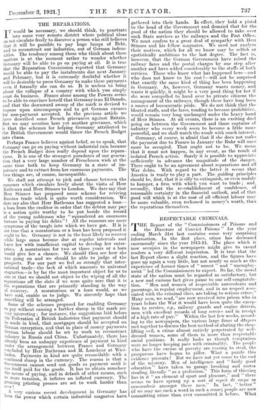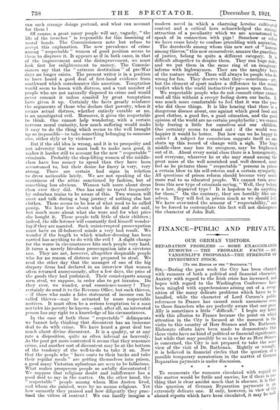RESPECTABLE CRIMINALS. T HE Report of the " Commissioners of Prisons
and the Directors of Convict Prisons " for the year ending March 31st last contains some very surprising information. In the first place, crime has decreased enormously since the year 1913-14. The place which it now occupies in the newspapers might give to casual readers a very different impression. It is true that the last Report shows a slight reaction, and the figures have gone up again a very little, but not nearly so much as the experience of former times of " unrest " and " unemploy- ment " led the Commissioners to expect. So far, the moral state of the nation must be regarded as satisfactory, but a new and curious fact gives pause to our self-congratula- tion. " Men and women of respectable antecedents and parentage, in regular employment, and in no respect asee- ciated with the criminal class, arc taking to serious crime."
Many men, we read, "are now received into prison who in years before the War it would have been quite the excep- tion to receive, e.g., railway guards and engine drivers, men with excellent records of long service and in receipt of a high rate of pay." Within the last few weeks, accord- ing to the newspapers, the various large firms of diapers met together to discuss the best method of abating the shop- lifting evil, a crime almost entirely perpetrated by well- dressed women, some of them in more than respectable social positions. It really looks as though temptation were no longer keeping pace with criminality. The peopla who have the excuse of poverty arc ceasing to steal, the prosperous have begun to pilfer. What a puzzle this evidence presents ! But we have not yet come to the end of the mystery. Men of intelligence and " fairly good education " have taken to garage breaking and motor stealing, literally " as a profession." This form of thieving has in it " an element of sport and pleasure," and " there seems to have sprung up a sort of esprit de corps or camaraderie amongst these men." In fact, " better " (if we may use such a word in such a sense) people are now committing crime than ever committed it before. What can such strange doings portend, and what can account for them 3 Of course, a great many people will say, vaguely, " the life of the trenches " is responsible for this loosening of moral bonds. The Commissioners note but refuse to accept this explanation. The new prevalence of crime among " respectable " women of good position seems to them to disprove it. It appears as if in both cases, in that of the improvement and the disimprovement, we must look first for enlightenment to money. The Commis- sioners say that the " extreme destitution " of pre-War days no longer exists. The present writer is in a position to have heard a good deal of first-hand evidence from southward which corroborates this assertion. Temptation would seem to lessen with distress, and a vast number of people who are not naturally disposed to crime and would never commit it unless assailed by great temptation have given it up. Certainly the facts greatly reinforce the arguments of those who declare that poverty, when it means actual distress, whether entirely curable or no, is an unmitigated evil. Moreover, it gives the respectable to think. One cannot help wondering, with a certain nervous moral curiosity, how much suffering would make it easy to do the thing which seems to the well brought up so impossible—to take something belonging to someone else, either slyly or by violence ?
But if the old idea is wrong, and it is to prosperity and not adversity that we must look to make men good, it makes it harder still to account for the new " respectable " criminals. Probably the shop-lifting women of the middle- class have less money to spend than they have been accustomed to, but their desire for finery is very, very strong. There are certain bad signs in relation to dress noticeable lately. We are not speaking of the scantiness of the attire sanctioned by fashion, but of something less obvious. Women talk more about dress than ever they did. One has only to travel frequently by suburban trains to be aware of this. Two women will meet and talk during a long journey of nothing else but clothes. There seems to be less of what used to be called gossip. We hear less about what he did and she said, but much more about what she wore and for what price she bought it. These people talk little of their children ; indeed, the idle listener will constantly find himself wonder- ing if they are married. Such uninterrupted preoccupation must have on ill-balanced minds a very bad result. We wonder if the length to which window-dressing has been carried has anything to do with the evil ? A slight change for the worse in circumstances hits such people very hard. It turns a merely frivolous preoccupation into a covetous one. They are not, however, altogether despicable people who for no reason of distress are prepared to steal. We read the other day that the manager of one of the big drapery firms had declared in an interview that women often returned anonymously, after a few days, the price of the goods they had purloined. Their counterparts among men steal, we suppose, in order also to get luxuries. Do they ever, we wonder, send conscience-money ? They certainly do send it to the Revenue Office, but such thieves, —if those who make a false statement of income can be called thieves—may be actuated by more respectable motives. It must often be a serious temptation to a man not to let his poverty be known—and, after all, no interested person has any right to a knowledge of his circumstances.
In the case of both these " respectable " delinquents we Cannot help thinking that discontent has an immense deal to do with crime. We have heard a great deal too much about divine discontent. It is a quality, or at any rate a disposition, quite as often infernal as heavenly. As the poor get more contented it seems that they renounce crime, and another sort of discontent may lie at the bottom of the tendency of the well-to-do to take it on. Now that the people who " have coats to their backs and take their regular meals " are getting themselves into prison, a good many Victorian aphorisms are seen to be fallacious. What makes prosperous people so awfully discontented ? We suppose that religious doubt and indifference has a good deal to say in the matter. On the other hand, the respectable " people among whom Miss Austen lived, and whom she painted, were by no means religious. Yet how earnestly they praised and how diligently they prac- tised the virtue of content I We can hardly imagine a modern novel in which a charming heroine cultivated content and a critical hero acknowledged the strange, attraction of a peculiarity which we are accustomed to speak of in connection with pigs ! Somehow or other we have come lately to confuse grumbling with aspiration. The daredevils among whom this new sort of " honour among thieves," this new camaraderie, amazes the guardians of justice, belong to quite a different category. It is difficult altogether to despise them. They run huge risks, and we put them in the same ring of an imaginina inferno with highwaymen. They are the naughty bot:i of the mature world. There will always be people who do wrong for fun. They deserve what they—sometimes—get, but the element of sport makes a difference to the moral verdict which the world instinctively passes upon them.
We respectable people who do not commit crime cannot read all this without a creepy feeling down our backs. It was much more comfortable to feel that it was the poor who did these things. It is like hearing that there is a dangerous disease about, one against which good food and good clothes, a good fire, a good education, and the good opinion of the world are no certain prophylactic ; we cannot help fearing a little for ourselves and our children. One certainty seems to stand out : if the world were happier it would be better. But how can we be happy to order ? A subject for consolation suggests itself as one shuts up this record of change with a sigh. The huge middle-class may lose its smugness, may be frightened out of it. About every social class there is a homogeneity, and everyone, wherever he or she may stand among the great mass of the well nourished and well dressed, must feel as he pictures these " respectable " persons in prison a certain blow to his self-esteem and a certain- sympathy. All questions of prison reform should become very much more real to us educated people. We cannot turn away from this new type of criminals saying, " Well, they belong to a low, depraved type ! It is hopeless to do anything for them." On the contrary, they are horribly like our- selves. They will feel in prison much as we should feel. We have over-rated the armour of " respectability," and to be forced to contemplate this fact will not disimpreve the character of John Bull.











































 Previous page
Previous page